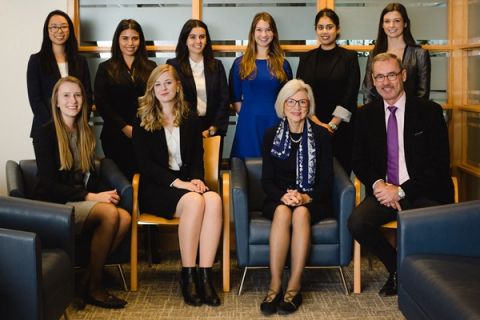
A November chill couldn’t dampen the enthusiasm of Queen’s Law students as they enjoyed a unique opportunity to meet, converse with and learn from Canada’s highest-ranking judge. Beverley McLachlin, Chief Justice of Canada, visited Queen’s on November 20, and the country’s longest-serving Chief Justice was the guest of honour at a lunch at the law school, a public Principal’s Forum event, and a small afternoon reception.
The visit with the Supreme Court’s first female Chief Justice was initially organized in early 2017 by Queen’s Women and Law, and the club, supported by Professor Gail Henderson, organized several activities around a centrally facilitated Principal’s Forum. “We selected students for the reception from our ‘Law Needs Feminism Because…’ photoshoot, a campaign we ran earlier in the year,” says Diane Wu, Law’19. “It was great to provide law students who are passionate about the unique challenges women face in the legal profession with an opportunity to meet and speak with the Chief Justice.”
“It was a very humbling experience being able to communicate with such an influential woman,” says Rachel Kurtzer, Law’19. “Chief Justice McLachlin was very warm and inviting. She engaged all those she spoke with, both during the talk and throughout the reception.”
At the Principal’s Forum, McLachlin answered questions from Dean Bill Flanagan before a capacity crowd in Wallace Hall. Less than a month away from her December 15 retirement, she touched on her career and the future of justice in Canada. “The topics ranged from representation of diverse and minority voices on the Supreme Court to the surprising use of section 7 of the Charter of Rights and Freedoms, rather than section 15, to uphold equality rights,” says Kelli McPhail, Law’19.
“Underrepresentation of equity-seeking communities continues to be a major problem in the legal profession,” McPhail continues. “It was promising to hear the Chief Justice use her platform to recognize and acknowledge barriers to equality continue to exist in the legal profession.”
All three students say the experience made them reflect on how fortunate they are to be pursuing a law degree. “Chief Justice McLachlin showed us that with a law degree there are countless opportunities for us to utilize it to make a positive impact on society.”
By Anthony Pugh